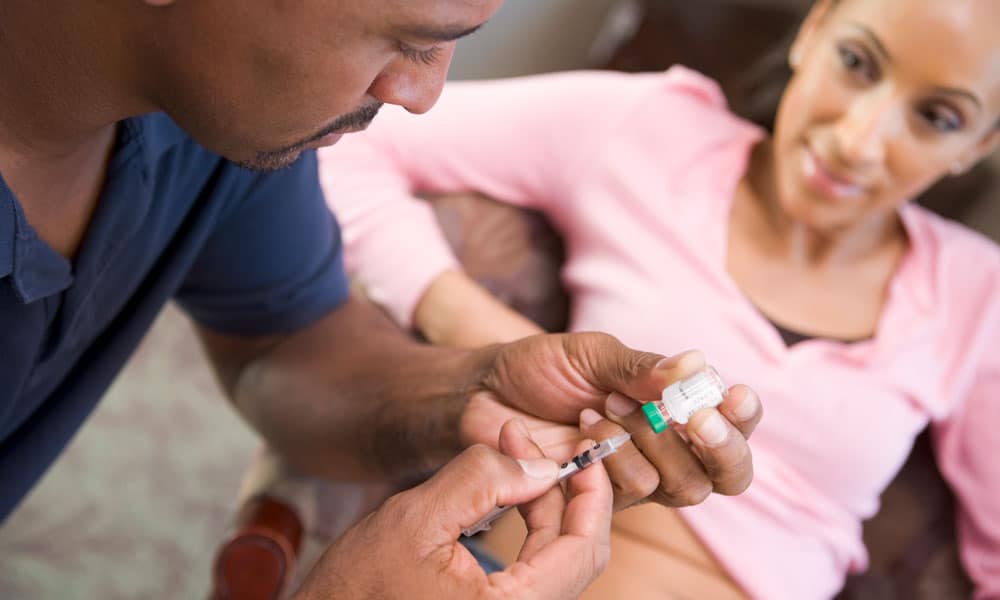Fertility Shots for Men and Women — Just the Basics
Fertility shots or injections, for both men and women, can be a subject fraught with misinformation, fear, and anxiety.

There’s a lot on the line when you’re attempting fertility treatments — it’s not simply the money (although that is definitely a concern, as these fertility shots can often be prohibitively expensive), but it’s how much is on the line.
For many folks, they can feel as if their future, their marriage, even their happiness, is on the line.
Many people have wanted to have children their whole lives, and the potential for failure of these treatments can be extremely disheartening.
Fortunately, there are many treatment options out there for both men and women. Depending on the cause of the infertility (and the sex of the person in whom the infertility originates), treatment can vary a great deal, from surgeries to medications to counseling (and everything in between).
However, for the purposes of this article, I’m going to focus as much as possible on fertility shots or injections. I’ll also talk a bit about treatments for cases that include physical damage to either the male or female gonads, where intervention through medication may be secondary to a form of surgery.
Fertility Shots for Men Depend on the Source of the Infertility
For men, infertility can have a variety of causes, including the following:
- Hormone imbalances
- Physical problems or damage (physical damage to the testes, vasectomy, varicocele)
- Psychological issues
- Erectile dysfunction
Obviously, these are broad categories, and not every category is going to require medication (or medication that is given in the form of a shot).
For instance, erectile dysfunction can generally be treated with drugs like Viagra or Cialis that are taken orally, in pill form.
In other cases, especially when a man suffers from a combination of erectile dysfunction and low testosterone, you may see use of a compounded version of these drugs that has been optimized for these specific combinations.
A psychological block that causes infertility issues is a different problem altogether, but such cases can be very treatable with the right forms of therapy.
For men who have physical damage to the penis or testes, or conditions like a blocked duct or a varicocele, surgery is often the only answer.
You may even find that simple changes in the way you live can restore fertility. Excessive use of alcohol, illegal drugs, tobacco products, and even excessive exercise, can all cause infertility — and are often simple problems to address.
Which leaves hormone imbalances, which is where you’re likely to see fertility shots administered. These shots are not so much aimed directly at “restoring fertility” as much as they are aimed at restoring your body’s natural balance of hormones.
This can include testosterone, but it can also include a wide variety of other hormones, like follicle-stimulating hormone (FSH), luteinizing hormone (LH), or prolactin.
As far as fertility shots are concerned, drugs that directly influence fertility levels (like Clomid, Parlodel, or human chorionic gonadotropin (hCG)) may be given via injection or in oral preparations to help restore the normal balance of your hormones. This can be especially important when testosterone replacement therapy is administered, as TRT can itself cause infertility.
Fertility Shots for Women Work in a Very Different Way
Male fertility treatments, though they may seem to be very complicated, can appear simplistic compared to the complex treatments required to help a woman who is suffering from infertility to become fertile.
The reasons for the added complexity when it comes to fertility treatments for women can be boiled down to this — a woman’s menstrual cycle, and the hormone fluctuations that this introduces into the equation, can add an extra layer of complexity to treatments (compared to a man’s treatment).
It’s not a matter of simply lining up a series of fertility shots and firing away — timeliness must be taken more carefully into account.
Interestingly, many of the treatments for women use the same drugs as some of the treatments for men. Men and women share many of the same hormones, just in different levels, which means that, when a hormonal imbalance is the source of a woman’s infertility, the same medications are going to be used, just in different amounts.
Now, women can also require surgical interventions when there is a physical problem behind the infertility. For instance, if your fallopian tubes are damaged or you suffer from endometriosis, surgery may be the only method to restore fertility.
Depending on how your hormones are acting in your body and what hormones are out of balance, a fertility specialist may recommend injections of FSH, LH, hCG, or other hormones.
Other medications may also be recommended to treat other hormone imbalances, like Bromocriptine for high levels of prolactin or Clomid to encourage your body to ovulate. Even hormone blockers can be prescribed to stop premature ovulation and help you get your cycle back on track.
Fertility Shots — Low Estrogen or Testosterone Can Also Affect Fertility
I have avoided talking about the two hormones that you’re likely most familiar with, estrogen and testosterone, too much up to this point, but, for both men and women, an imbalance in these hormones can be responsible for infertility.
For women, estrogen replacement therapy may be required before considering other hormone deficiencies.
For men, especially men suffering from erectile dysfunction, testosterone replacement therapy may be indicated to help restore normal function, but as stated before, will suppress fertility.
If you just need someone to discuss your symptoms with, a professional who can point you in the right direction, set up a free consultation with one of our medical providers.
We’ll happily discuss your symptoms, your options, and assist you in finding the help that you need.
Click the button to set up your consultation.
